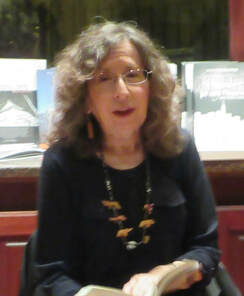|
Carol Smallwood’s most recent books include: In Hubble’s Shadow (Shanti Arts); Prisms, Particles, and Refractions (Finishing Line Press); Interweavings: Creative Nonfiction (Shanti Arts), and three edited librarianship anthologies. Interview of Mindy Kronenberg Mindy Kronenberg is the publisher, editor of Book/Mark: A Quarterly Small Press Review located in Miller Place, New York. It welcomes inquiries, reviews (500-950 words), of small press books which it publishes in print, hard copy. Mindy’s work appears in many journals and anthologies: cyberpoet@optonline.net
Smallwood: When did Book/Mark: A Quarterly Small Press Review begin? What are some of the places it is archived: We’ve been around since 1994, and archived with the NY Public Library, Poets House, NYC, William and Mary College (Williamsburg Virginia), listed with the Critics Circle Guide, International Directory of Little Magazines and Small Presses, The Writer’s Handbook, distributed through the Suffolk Cooperative Library System, and a member of the Community of Literary Magazines and Pressed (CLMP). Smallwood: what kinds of books are reviewed: that is nonfiction, poetry, and what others? Have you seen a rise in memoir? We are very eclectic and like to bring attention to a variety of genres/styles coming out of the small and independent press arena: poetry, fiction, criticism, nonfiction, history, politics, science, children’s literature, and yes, memoir. There has been great interest in memoir and personal narratives. We also include books from university presses, cooperative publishers, and occasionally, self-published books that deserve attention. Smallwood: I read in the Fall 2017/Winter 2018 issue that you noted: “Now, more than ever, we all need to remind ourselves of how our words can carry our stories, and our shared humanity, to each other.” What changes have you detected in the writing world? Yes—that was from my editorial, reminiscing about my participating in the Arts in Harmony Festival in Indiana that emphasized “The Celebration of the Written Word” the strengthening process that occurs when we come together and share our personal and collective narratives. I think writers (and their audience) need to continue gathering, sharing, and discussing their work as potential agents of change. I believe the proliferation of writing communities and publishers have bolstered this effort. Smallwood: Where are some of the places you travel for readings and talking about the writing process? I truly enjoy having an opportunity to share my work and engage in discussions at a variety of venues—arts, academic, and public. I’ve been a speaker/reader at Arts in Harmony, Indiana (mentioned above), The AWP (Associated Writing Programs) writers conference in Chicago (panel discussion on writing/book reviewing), Bright Hill Literary Farm in Delhi, NY, the Hudson Valley Museum of Contemporary Art, libraries, schools, and museums across Long Island and in NYC, and most recently a book fair sponsored by the Brentwood School District on Long Island. In March I will be doing a reading at the B.J. Spoke Gallery in Huntington, NY to discuss my recent book, Open, and read my poetry. Smallwood: What are some of the journals and anthologies that you appear in? My work appears in such anthologies as Like Light: 25 Years of Poetry and Prose By Bright Hill Poets & Writers (Bright Hill Press), The Heart is Improvisational (Guernica Editions, Canada), Eternal Snow, A World-Wide Anthology of Over 125 Poetic intersections With Himalayan Poet Yuyutsu Sharma (Nirala Editions, New Deli), Poets for Paris and Bards Against Hunger, 5th Anniversary Edition Anthology of International Poets (Local Gems, NY), and Birds: A Flight of Poems (Feral Press/Prehensile Pencil Press, Oyster Bay, NY). My poetry/stories have appeared online at Summerset Review, Greenwich Village Review, Poetry Bay, and as part of the International Ekphrasis Project (Versopolis journal). Smallwood: There is a great deal of competition to get reviews accepted and I thank you for helping. Hard copies of reviews are not common, and it is a pleasure to receive them. Do you have any advice that will help struggling writers and poets? We do what we can! Book/Mark has been around long (enough to see the impact of desktop publishing and the rise of small and independent presses, which has been a boon to emerging poets and writers who have less of a chance with the big guns in the publishing industry. The gradual proliferation of independent book stores also helps the cause, actively presenting readings, book discussions, events to publicize/support social causes, advocate for free speech, and introduce new presses and authors. I would simply advise to stay active, participate in or attend open readings at libraries and bookstores, connect with writing groups, go to conferences and fairs and workshops, read all you can that’s being published, especially among the small press publishers since they are largely open to novice and lesser-known writers. Smallwood: Who are your favorite writers? Your favorite quotation? I always find this first question difficult, since there are so many exemplary voices out there, recognized and new. For right now, a very short and eclectic list: Jericho Brown, Juan Felipe Herrera, Shari Wagner, Daniel Thomas Moran, Kaylie Jones, J.P. Redmond, M.J. Moore, Ted Kooser, and Claire Nicolas White. The joy and privilege of reviewing small press books is becoming acquainted with unfamiliar and emerging voices, and my book shelves are stacked with myriad poems and stories by these authors, who make their way into my classes on creative writing. As for quotes on writing, three that I have on my office door: “A writer is a world trapped in a person (Victor Hugo);” “I write to discover what I know (Flannery O’Connor);” “Always be a poet, even in prose (Baudelaire).”
0 Comments
Lois Greene Stone, writer and poet, has been syndicated worldwide. Poetry and personal essays have been included in hard & softcover book anthologies. Collections of her personal items/ photos/ memorabilia are in major museums including twelve different divisions of The Smithsonian. The Smithsonian selected her photo to represent all teens from a specific decade. Rub Out Erase! Absolutely erase! We don’t need the book burning from Fahrenheit 451 as the smoke might change the atmospheric conditions and the EPA will frown on that. Just condemn and remove anything we deem ‘offensive’. Okay. Let me give you an example. The American Library Association’s board that oversees the Library Service to Children voted unanimously to eliminate Laura Ingalls Wilder’s name from its award. “Wilder’s legacy...includes expressions of stereotypical attitudes....”; her famous novel “Little House on the Prairie” written in 1935 about her family’s life in the midwest and west really was society and its daily living in that era. Wilder described sickness, tragedy, survival, and impressions in a part of the country that were also the fears, hopes, values of the period.
Circa 2018, we’re removing statues we don’t like rather than feel uplifted that inclusiveness is our aim now and these stone/metal figures are reminders of a past. Perhaps the Lincoln Memorial will be removed by those who feel Marfan’s Syndrome is celebrated by Lincoln’s frame, which is definitely offensive, and also his position during the Civil War. Perhaps Hyde Park in the Hudson Valley of New York State ought to be a hotel rather than a museum as Roosevelt had a mistress while his legal wife lived on the grounds of that estate. And, wheelchair-bound people, could be angered that President Franklin Delano Roosevelt hid, in photos taken of him, his need for such a conveyance. If he were ashamed of his legs and pretended he was able-bodied, where are the protestors (who prefer to not be called ‘handicapped’) asking to have FDR erased? What shall we do with lovely Mt. Vernon since Washington had slaves; might it be made into a casino? What do you think? A bridge aptly identified for connecting three counties in the greater New York City area, the Triborough Bridge, was re-titled for Robert Kennedy who was not even a New Yorker! Who found the descriptive name triborough needing an erasure? Interesting that ‘freedom of speech’ is sung on college campuses as if it were a universal alma mater tune. Many Professors don’t open minds to evaluate, collectively, but make their personal statements paramount; students who might disagree with a Professor’s attitude and values decide, to maintain a grade, to either lie on a term paper if they have a different opinion or write their own feelings and risk their GPA. Let the hens out of cages or some will vandalize the egg farms. Vandalism is okay but hens raised only to produce eggs must have good living conditions. The homeless? The veterans who still haven’t the exceptional medical care so deserved? Oh, they made choices to live on the streets, or to put themselves in harms way in some war-field far-far from American shores. We’ve erased much of Miss or Mrs. to define women’s status replacing that with Ms.... except at Wimbledon circa July 2018 as that country’s tennis matches still uses ‘courtesy titles’. Is this All-England Club clinging to an outmoded form of address? Women’s names connote marital status and the male players are merely, well, male players called by last names on court. If viewers don’t know which men are unwed, why should it know about the women’s status? Hm. I guess the eraser might make it’s way to Wimbledon eventually and only last names will be called from the scorer’s bench. Maybe the huge gummy rubber will bear the name Wilder on the packages. Each movement can further blot out her life and times as it eliminates anything that is deemed ‘offensive’ in every book, then we can wipe-out films, there are many photos and art that would have to go..... Or, perhaps we might, as a society, improve and learn and educate but not obliterate.  Mike Gadell's work has been published in the Williamson County Sun, Southside Today, Long Story Short, Christian Living in the Mature Years, and Flashes of Fear. He is a Navy veteran and a retired college professor. Born in Florida and educated in Georgia and Texas, he now travels, volunteers, writes, and enjoys life in central Texas, where he lives with his wife of 35 years, Diane. Protest |

 RSS Feed
RSS Feed